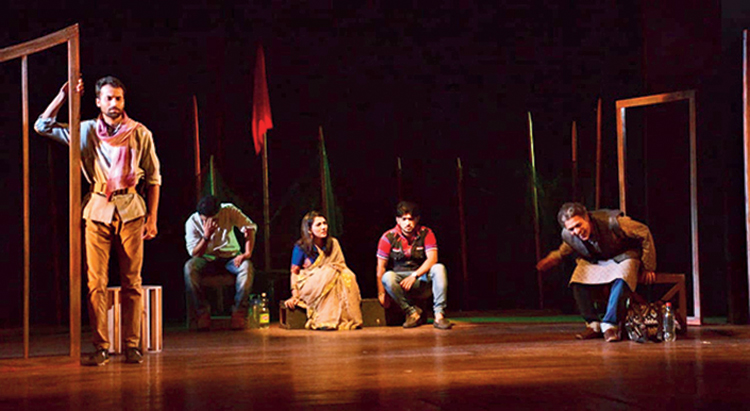Bhan, led by the creative impulse of the talented Gouranga Dandapat and driven by the youthful verve of the rest of the team, premiered two new productions, Bishadigdha and Bidyar Sagarera at Gyan Manch. Dandapat has written and directed both plays. Overtly political, Bidyar Sagarera continues to signal the signature reputation — established by earlier works such as Go Charit Manash and Teluram Terrorist — of Bhan as a group with a bent for political commentary. On the other hand, Bishadigdha comes across as a deliberate attempt to venture into uncharted territory for both Bhan and Dandapat, with the play eschewing the world and its myriad cares to delve into the troubled minds of two individuals.
Priti and Upal, the two characters in Bishadigdha, are rather sketchily drawn so that the motivations for their actions are not always apparent; even the lengthy reminiscence designed to reveal the characters’ histories does not quite help flesh out the two. Aspects of Priti’s psychosis are poignantly conveyed by Debahuti Sarkar, such as the escapist fiction-making with soft toys that are given striking names and are spoken to. In the initial segments, Sarkar’s inaudibility is an issue, as is Gouranga Dandapat’s tendency to over-portray towards the end. Directorially, Dandapat may wish to find a means to keep the narrative taut with an element of suspense-ridden foreboding and not let the play slacken as it has at times; the many silences and pauses are areas requiring directorial attention.
Although Bidyar Sagarera is plumb within Bhan’s generic comfort zone, the play was rather disappointing. The text hovers indecisively for a long time between comic satire and serious political drama; the acting is marred by numerous instances of unmotivated movements; the plot is too predictable to be gripping. The text is as unreasonably lenient towards the university professor as it is harsh towards the actor and the feminist poet. The suicide of the Naxalite leader in the end is melodramatic at best and manufactured at worst. However, the best thing about the play is that it gets its politics right which is a big positive in our unsettled times.










